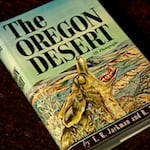
Back in the early '60s, Russ Jackman, a retired OSU extension agent, and Reuben Long, a colorful Fort Rock Valley rancher, collaborated to create a book. The result, "The Oregon Desert," was unique. It successfully blended natural science with cowboy humor and scholarly prose with casual meanderings. It was a celebration of rural Western storytelling, and over the years, it has become a Pacific Northwest classic.
Reub Long, who died in 1974, lived his whole life in a flat, dry area of northern Lake County. Today, tourists drive the scenic Backcountry Byway, ORV enthusiasts crowd the sand dunes in their four-wheelers, and irrigation has carpeted the landscape with crop circles. But back in Long's time, the Fort Rock Valley was just inhospitable desert. It has always been a tough place to earn a living, and most who have tried have failed. But life on the desert has its pleasures, too, and with his ever-wry wit, Reub Long loved to talk about them.

Since man first chipped words on slabs of stone, he has tried to describe the desert. He has said it is cruel, brutal, ruthless, ugly, horrible, appalling, and fraught with terror.
He has fled from it, fearing the thirst and death that stalked its interminable reaches. At the word "desert," imagination pictures the dying man, forcing his failing steps toward the false promise of the mirage, calling thickly with his swollen tongue, "Water! Water!" And, of course, it is a lack of water that makes a desert.
The Oregon desert is the "high desert" and is not so hot as Iran, not so wind-combed as the Sahara, and its nights are usually cold. It may be snow-covered in winter.
We Oregonians didn't know it was much of an asset. We shooed strangers away from it, showing them our mountains and trees, as the real-estate man keeps the prospective house buyer away from the side with termites.
In Oregon a quarter of our state is desert, and we'd better be getting proud of it. Reub Long says that if we don't the dudes will take us just like we took the Indians.
I freighted when I was young, because there was lots of freighting to do. Homesteaders kept coming and what they owned had to be hauled to their places: bed and mattress; a cookstove and a heater of some sort, some farming tools, pots and pans; and most of them had enough boards to throw a shack together. I hauled for them for money, a cow, an old horse, or a promise. A few years later I hauled out some of the same families I had hauled in. They had less to haul out than when they came, and had less money to pay me.

The "long line skinner," driver of the jerk-line teams, has never had his just share in Western drama. He was hundreds of times more useful than the short-lived pony express. He was even more important than the celebrated stagecoach drivers, because they delivered a few passengers each, while he kept entire communities supplied with goods. He hauled supplies to the stage stations, or they couldn't have operated.
Most of the small animals of the desert are not seen by the traveler, but each of the desert counties will have perhaps ninety different species of mammals, maybe two hundred or more different birds, a dozen reptiles, insects by the hundreds, and thousands of plants.
To get some inkling of the animal life, find a place where there is a rod or two of smooth sand. Toward night take a board and level the loose sandy soil, making a surface free of all tracks. Then go to bed in the back of a station wagon.
At first you will be wrapped in a blanket of stillness, but soon you hear the dozens of little desert folk. Scratchings, squeaks, whirs, small cries of terror, create an impression that minute chaos is erupting - all of this in an area apparently devoid of life. If there has been no wind, examine at daylight the smooth sand-parchment sheet you prepared. Every square foot of it will record travels of little animals.
[Y]ou can usually get along if you aren't a specialist. Nowadays men list their jobs as "freight car wheel inspectors" or "bottle fillers," and if those particular jobs aren't available, the men are eligible for unemployment checks. My only way to check unemployment was to go to work - it beat hunger quite a bit, even if the work is out of one's line. So I cooked, trapped, freighted, wrangled dudes, trained horses, lambed sheep - just anything there was to do. I learned to do lots of things, but some of the things aren't of much use to me now - for example, how to put a six- or eight-horse team around a sharp bend. But some are real useful. What you learn from horses helps in dealing with humans. A horse is good for a boy or a man. It helps something inside of him. A man trained by a horse for many years is never quite the same afterward, and is better.
Resources
The Oregon Desert by E.R. Jackman & R.A. Long, Caxton Press Caldwell, Idaho (1964). www.caxtonpress.com
Broadcast Date: October 30, 2006